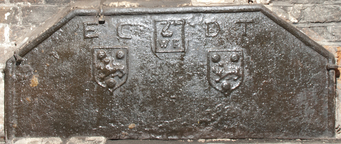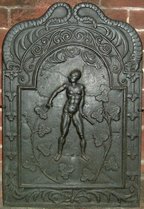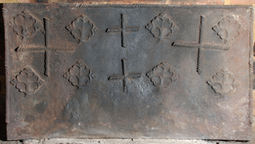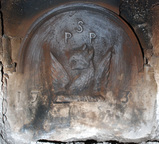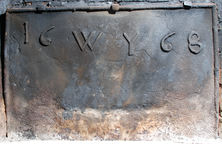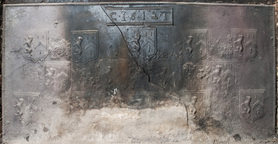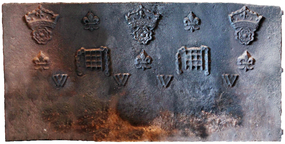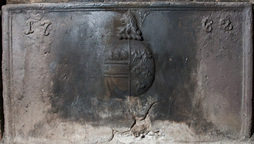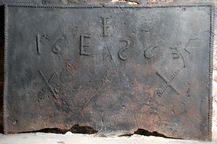-
1077
Description: Canted rectangle; astragal edging (top and sides); symmetrically arranged, initials separated by overpressed, fillet edged stamp bearing letters WF surmounted by a bent arm holding a battleaxe issuing from a chapeau; beneath are two shields bearing the arms of Fowle.
Notes: The shield and crest stamps relate to William Fowle (1568-1634) and are those used on iron grave slabs in Wadhurst and Frant churches and in Maidstone museum, as well as on other firebacks. The initials have not been identified. Another casting with the same set of initials, but in a slightly different arrangement, has been noted (no. 68), and Christy (1908 p.386) reported on another with slots for two firedogs.
Inscription: EC DT / WF
Arms: William Fowle, of Frant and Wadhurst
- Decoration tags:
- rectangular with canted top corners (shape)
- astragal (edging)
- carved stamps
- individual letters
- heraldic
- armorial
- text
Manufactured: in the early- to mid-17th century probably at Riverhall Furnace, Wadhurst in the Weald area of England.
Current location: in private hands, Minster-on-Sea, Kent, England.
- Attached to series:
- Fowle series
-
866
Description: Rectangular with a sinuous arch and three simulated loops, one top centre, the other two to each side; two-handled flower vase with gadrooned upper surface and acanthus bas-relief below, trailing fruited vines issuing from top descending through handles to base; lion’s mask at top; date split either side of vase base; ball on each shoulder of the plate; broadened side edges.
Notes: The simulated loops are seen on a small number of other firebacks, suggesting a common pattern-maker; a variation on a design typical of this period.
Inscription: 16 77
- Decoration tags:
- rectangular with ornate arch (shape)
- fillet (edging)
- whole carved pattern
- individual numbers
- extension panels
- pictorial
- text
- plants
- objects
Manufactured: in 1677 possibly in the Weald area of England.
Current location: Metropolitan Museum of Art, 1000, Fifth Avenue, New York, New York, United States of America.
Museum number: 08.81.1 (part of the Metropolitan Museum of Art, New York museum group)
- Attached to series:
- Gadrooned vase firebacks
- Loop edged firebacks
-
500
Description: Arched rectangular shaped central panel with astragal and fillet edge, pictorial, a bald, naked man, standing on a mound, holding a baton in his left hand, surrounded by leaf fronds to left and right, and clouds above; arched rectangular shaped border, fillet edging, hanging leaf clusters to left and right, swirled lines above, and draped foliage with monogram at base; on top are two serpents and draped foliage.
Notes: The figure may represent Pheidippides, the messenger between Athens and Sparta during the Battle of Marathon in 490BC.
Copies of this fireback are known.
Inscription: TAN
- Decoration tags:
- 'Dutch' (shape)
- fillet (edging)
- whole carved pattern
- pictorial
- mythological
- monogram
- text
- humans
Manufactured: in the early-18th century probably at Ashburnham Furnace in the Weald area of England.
Current location: West Berkshire Museum, Newbury, Berkshire, England.
Citation: Lloyd, N., 1925, 'Domestic Ironwork I', Architectural Review, 58, pp. 58-67.
- Attached to series:
- TAN series
- British 'Dutch' style firebacks
-
846
Description: Rectangular; twisted rope edging (top and sides); floriated trefoil stamp repeated in two rows of four in the upper two-thirds of the plate; between the middle four stamps, two small crosses of twisted rope, one above the other; between each outer group of four stamps a large cross of twisted rope.
Notes: The floriated trefoils may have been derived from a metal ornament.
- Decoration tags:
- rectangular (shape)
- rope (edging)
- simple stamps
- apotropaic
- objects
Manufactured: in the mid- to late-16th century in the Weald area of England.
Current location: in private hands, Barcombe, East Sussex, England.
- Attached to series:
- Miscellaneous stamp firebacks
- Metalware stamp firebacks
-
501
Description: Arched rectangular shape; ovolo-moulded edging; central crest of a gryphon's head couped, its wings displayed; above, the initials, the 'S' above the 'P's; below, the date.
Notes: The crest is likely to be that of Peter Short of Lindfield, Sussex, who married Philadelphia Burrell in 1704.
Inscription: PSP / 1730
Arms: Short of Lindfield
- Decoration tags:
- rectangular with round arch (shape)
- ovolo (edging)
- carved stamps
- individual letters
- individual numbers
- heraldic
- text
Manufactured: in 1730 possibly in the Weald area of England.
Current location: in private hands, Newick, East Sussex, England.
- Attached to series:
- Personal firebacks
- 1730s-40s, date & initial series
-
504
Description: Rectangular; twisted rope edging (top and sides); along upper half of plate, date split with initials in between.
Notes: The initials are likely to be those of William Yalden (d.1674), an ironmaster who was active in north-west Sussex and south-west Surrey where this and other similar firebacks have been noted.
Inscription: 16 WY 68
- Decoration tags:
- rectangular (shape)
- rope (edging)
- individual letters
- individual numbers
- text
Manufactured: in 1668 in the Weald area of England.
Current location: in private hands, Northchapel, West Sussex, England.
- Attached to series:
- William Yalden series
-
1316
Description: Rectangular; twisted rope edging on top and sides; cavetto-moulded-edged rectangle top centre (left side missing), enclosing date between initials; 14 shields of Ayloffe impaling Sulyard in three rows (5-4-5); Ayloffe: sable, a lion rampant Or, collared gules, between three crosses formy of the second; Sulyard: argent, a chevron gules between three pheons inverted sable.
Notes: William Ayloffe (c1535-1584) of Bretons, Hornchurch, Essex, Justice of the Court of Queen’s Bench, married (c1560) Jane, dau. of Sir Eustace Sulyard, of Runwell, Essex. The initials 'CT' are likely to be those of Charles Tyler, a founder whose working life and that of his family have strong parallels with the occurrence of these firebacks. The excrescences between some of the shields are the result of inexpert ladling of the iron during casting. The absence of the left side of the frame of the inscription panel has also been noted on another back in this series, also dated 1612.
Inscription: C.1.6.1.2.T
Arms: Ayloffe impaling Sulyard (William Ayloffe of Bretons, Hornchurch)
- Decoration tags:
- rectangular (shape)
- rope (edging)
- carved stamps
- individual letters
- individual numbers
- armorial
- text
Manufactured: in 1612 possibly at Bedgebury Furnace, Goudhurst in the Weald area of England.
Current location: Great Dixter, Northiam, East Sussex, England.
- Attached to series:
- Ayloffe series
- Personal armorial firebacks
-
1222
Description: Rectangular shape; no edging; symmetrical arrangement of four stamps: across the top, three crowned roses with a fleur-de-lys between each pair; across the middle, three fleurs-de-lys with a chained portcullis between each pair; below and in the spaces between the fleurs and portcullises, four letters W.
Notes: The letter W may have an apotropaic significance; the stamps have not been recorded on other firebacks.
Inscription: W W W W
- Decoration tags:
- rectangular (shape)
- none (edging)
- carved stamps
- heraldic
- apotropaic
- text
- objects
Manufactured: in the late-16th century possibly in the Weald area of England.
Current location: Great Dixter, Northiam, East Sussex, England.
- Attached to series:
- Miscellaneous royal firebacks
- Fleur-de-lys firebacks
-
1317
Description: Rectangular; cavetto-moulded edging (top and sides); date, in s florid style, split between top corners; central oval shield of impaled arms surmounted by a crest of a lion's head erased upon a wreath.
Notes: George Worge (1705-65), of Starr’s Green, Battle, sometime steward of the Battle Abbey estate, married Elizabeth (1707-66), eldest daughter of John Collier, town clerk of Hastings, in 1727. The arms of Worge have been variously blazoned, but most commonly they are: gules, a fess ermine cotised argent, in chief three lion’s heads erased of the last; Collier - argent, on a chevron azure, between three unicorns courant couped gules, as many oak sprigs fructed proper. The arms and crest in the same form can be seen on a fireback with an elaborate border (no. 757).
Inscription: 17 62
Arms: Worge impaling Collier (George and Elizabeth Worge)
- Decoration tags:
- rectangular (shape)
- cavetto (edging)
- carved stamps
- individual numbers
- heraldic
- armorial
- text
Manufactured: in 1762 probably at Robertsbridge Furnace, Salehurst in the Weald area of England.
Current location: Great Dixter, Northiam, East Sussex, England.
- Attached to series:
- Worge/Collier series
- Personal armorial firebacks
-
505
Description: Rectangular; twisted rope edging (top and sides); inscription (‘S’ reversed) across upper middle of plate, with superscripted central ‘I’ (crossed) ; below each part of the date is a twisted rope saltire (145mm lengths).
Notes: A personal fireback, made to order; a similar commission by Giles Moore, Rector of Horsted Keynes, Sussex, in 1657, cost 13 shillings.
Inscription: I / 16 E S 63
- Decoration tags:
- rectangular (shape)
- rope (edging)
- simple stamps
- individual letters
- individual numbers
- apotropaic
- text
- objects
Manufactured: in 1663 in the Weald area of England.
Current location: in private hands, Ockley, Surrey, England.
- Attached to series:
- Date & initials firebacks
- Rope design firebacks
